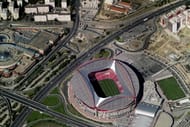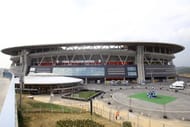For anyone who has been confronted by it, a blank page can spell either doom or possibility. Either one frets about what has not been written, or is invigorated by the promise of what can. I could say that for the last six months or so, life was elsewhere, but that would mean using a fashionable literary expression to disguise my half-hearted attempts at filling notebooks with purple prose and incisive journalism. Like a lover felt slighted by an unenthusiastic seduction, the words seemed to have walked out of my world, not with a huff and a throwing up of the arms, rather with a sigh and subsequent exit that can only be described as a slinking away.
As the semester in Europe enters the leg where one begins to wonder when was the last time that the thought of the dog days of an Indian summer engendered a quiet excitement, I have decided to put pen to paper (and fingers to keyboard) in the manner of a diarist or a foreign correspondent, putting together my dispatches of the football life in some of the places that I have been to recently. There was a time when navigators and adventurers from the places I write about would shoot off to their patrons impressions of bountiful lands and their unschooled natives. These dashers would invariably be followed by hatted colonial administrators, whose own dispatches would be rich with accounts of their efforts to impose a semblance of order on lawless native societies. I evoke these accounts not to portray a sense of writing back to the Empire, but only to imbibe the spirit of observations made and attempted to be conveyed from places far away from home.
Barcelona
They call it la catedral. And this is the city of the Sagrada Familia. The metro station you must alight at depends on the part of the ground where you are to be sitting. We are to enter through Door 66 so Les Corts on the Green Line is where we need to get off. There are several father-son pairs on the metro. Wearing the red-and-blue or the colours of Catalan identity – the yellow-and-orange. Crushed against so many others, a father is painstakingly explaining the concept of a transfer to the little fellow who reaches his waist. Everywhere, they are talking about the evening’s derby. And Real Madrid. They are always talking about Real Madrid. We don’t need to ask for directions. We just follow the faithful. They’re spilling out of the innumerable bars, sipping pre-match beers and wolfing down tapas. The hulking magnificence of the Nou Camp comes into view.
Seated next to me is a woman who looks like she’s on the wrong side of fifty. She screams, shouts, gestures, coos and mutters at her boys on the field. The man sitting on my right notices that it I am overwhelmed by it all. Gallantly, he translates something that the woman mutters to him after reaching across me. She is saying, you know, that Neymar needs to put on more weight. The boy has to eat better.
The day after, I get chatting with a bartender. I ask him about how young people are taking the economic situation in Spain. A lot of them are leaving, he says. His English is not bad at all, and he tells me he speaks French too. I ask him why he hasn’t left. I did think of moving to London or Paris maybe, but my team plays here. I can’t just leave.
Belgium
On the night that Belgium’s Red Devils secures qualification to Brazil 2014, the streets of the university town of Gent are ringing with Vengaboys’ Brazil. Tonight, there is no Flanders and no Wallonia. Tonight it does not matter whether you speak French or Dutch. It only matters whether you are screaming with joy because your country is going to compete in the biggest sports tournament in the world. The politics of language and region will go on, but over the semester in Gent, I have come to realize that the bickering will cool off this summer, as a country gets behind its boys, regardless of their origins.
The signs are everywhere. At the ATM, Marouane Fellaini grins from the screens. The pils so beloved of broke university students, Jupiler, has the players’ and manager’s faces stamped on cans that are in the colour of the team’s kit. In stationary shops, there are Coca Cola postcards with an image of the team celebrating a goal and with lines that loosely translate to After a hellish winter will come the summer of the Devils.
Lisbon
Crouched in an almost foetal position in my uncomfortable seat on the Ryan Air flight to Lisbon, I am nodding off. Seated behind, my friend grabs me by the shoulder and asks me to look outside the window. From my aisle seat, I lean over and take in the golden sands running into the never-ending Atlantic. From my vantage point, it would seem as if waves were a myth. As the aircraft descends, I am momentarily transfixed by the foamy patches on the vast ocean. And then I see it. The unmistakable red iron beams of the Benfica’s Estadio da Luz.
A few moments later, I see a second sight. The dark green roof that can only be Sporting Lisbon’s Estadio Jose Alvalade. My mind goes back more than nine years ago, when I first saw the red and green structures during Euro 2004, the tournament for which the stadiums were revamped. These sites are intimately associated with maestros like Eusebio, Figo, Rui Costa. Saudade is a Portuguese word that has no direct English translation. It can be described as a feeling of emptiness or longing for something which has been lost irretrievably. It is said that if one stays in Portugal long enough, one can experience saudade. I have my saudade moment before we even land in Lisbon.
The reception desk at the hostel is manned by a vivacious guy called João. João like João Moutinho, I ask? Exactly! But I must let you know that he is a traitor in my eyes. Sporting Lisbon, we took care of him for so many years. He became a great player at Sporting. And then he just left for Porto. You don’t go to a rival team just like that, just because you are offered more money. He is visibly hurt, and I hastily distract him by congratulating him for Portugal’s recent qualification for the World Cup. Obrigado, he says, grinning again.
Istanbul
I thought Europe was football crazy. And then I came to Turkey. On the ferry from Kadikoy to Besiktas, I watch the top ten goals from the weekend’s Turkish League action on a flat-screen. A man in a tattered brown blazer and shabby stubble is similarly occupied. When it ends, there is a hint of a smile on his face. Our eyes meet, and he points at the television screen and flashes me a thumbs-up sign.
The BJK Inonu stadium is only a short walk from the Besiktas ferry terminal. The only stadium in the world from where one can see two continents. The stadium is being redeveloped, but I can see the historic tower with the club crest on it even above the barricades that are plastered with the Vodafone logo. From almost under the tower, I look across the Bosphorus to the other continent.
Nothing is lost in translation when I ask “Galatasaray, Fenerbahce, Besiktas”? Irrespective of loyalties, I always offer a thumbs-up to my comrade, to indicate that I share his passion. A whole new world opens up that way. A couple of university students walk with us for almost a kilometer to help find a place we are looking for. In the Grand Bazaar, a wizened old vendor sipping apple tea teaches me to pronounce Galatasaray correctly. The Western world tends to pronounce the word at once, but it is in fact two words put together. Galata is a historic region on the European side of Istanbul, home to the Galatasaray Lissei, the prestigious high school where the club was founded. Saray is Turkish for palace. There is a fourth club in Turkey, make no mistake. Trabzonspor has a rather big following in Istanbul too. The supporters are mostly migrants from the north-east, where Trabzon is based.
In a bread store, the genial owner tells me about the UltrAslan, Galatasaray’s radical supporter group that saved the club from bankruptcy with money made from the sale its own merchandise. He tells me about bands of UltrAslan marching down from Tunel to Taksim Square on Istiklal Street with their hands in their jackets. Some of them are hiding knives. He doesn’t approve of the violent overtones associated with football in this country. His assistant, a young man in his twenties, shakes his head. It is simple, he tells me. When clubs from Europe come to play here, we want them to know they are in hell, that football for us means more than it ever has for them.

